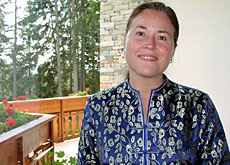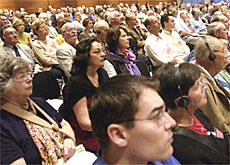A Swiss abroad represents El Salvador overseas

María Eugenia Brizuela de Ávila is not just a Swiss citizen – she’s also the foreign minister of El Salvador.
swissinfo caught up with de Ávila – a diplomat with dual nationality – at the 81st Congress of the Swiss Abroad in Crans Montana.
De Ávila says she is counting on her distant homeland to support the development of the Central American country which she represents abroad.
swissinfo: As the foreign minister of El Salvador, how do you relate to Switzerland?
María Eugenia Brizuela de Ávila: I inherited my love of Switzerland from my grandfather and my mother. What appeals to me is the broad vision of four cultures, four languages and four ways of thinking which have co-existed harmoniously for hundreds of years.
swissinfo: When you met your Swiss counterpart, Micheline Calmy-Rey, did you think you were talking to a compatriot?
MdA: Absolutely – and this was brought home to me when the Swiss president, Pascal Couchepin, joked that Switzerland was lucky enough to have two female foreign ministers! More seriously, Switzerland has always had a special place in my heart, and I know that Swiss people who live abroad are ambassadors to the world.
swissinfo: Do you often visit your Swiss ancestral home?
MdA: Regrettably, I don’t. My family home in Switzerland is a very long way from El Salvador. My grandfather, Juan Boillat, came from a beautiful part of the countryside described as “one street and a great many cows”. It is called La Chaux-des-Breuleux, in canton Jura.
swissinfo: Switzerland’s position as a financial centre has been the main focus of debate at this year’s Congress of the Swiss Abroad. Do you support the country’s tradition of banking secrecy?
MdA: I think banking secrecy is important to a financial centre’s development and to the banking system as a whole. But access to information must always be possible, and this is something which is crucial in the fight against financial terrorism.
Criminals cannot be allowed to get away with abusing a system which has taken years to create.
swissinfo: What are El Salvador’s greatest concerns at present, and how might Switzerland help to resolve them?
MdA: In just ten years, we have succeeded in halving cases of extreme poverty, but our task now is to generate employment and create opportunities for people to earn a decent wage and offer them a better future.
We’ve been helped in this effort by international cooperation. Switzerland’s role has been twofold: providing technical assistance and supporting the opening of markets and entrepreneurial development.
El Salvador also suffers from natural disasters such as earthquakes, hurricanes and drought. Two earthquakes in 2001 left one-fifth of the population homeless. Switzerland contributed humanitarian aid, rebuilding four of the most damaged townships.
swissinfo: Switzerland is now a member of the United Nations. How do Salvadorians view the country’s presence in the UN?
MdA: We think full participation by Switzerland in the UN is very important. It is proof of the country’s solidarity and commitment [on the world stage].
We shall be in Geneva in December for the World Summit for the Information Society, which Switzerland is hosting. This is the kind of contribution we would like to see from all countries as the international community strives to build a better world.
swissinfo interview: Juan Espinoza, Crans Montana
El Salvador has a population of 6.4 million people and its main exports are coffee and sugar cane.
The country is prone to natural disasters such as earthquakes, floods and landslides. A severe earthquake in 2001 killed more than 1,000 people and left about 330,000 people homeless.
Switzerland’s aid to El Salvador amounts to SFr5 million each year.
Nestlé is the only large Swiss company operating in El Salvador.
Maria Eugenia Brizuela de Avila was born in San Salvador on October 31, 1956.
She has Swiss and El Salvadorian nationality, is married to an engineer and has three children.
She studied French at Geneva University and obtained a diploma in French language and civilisation from the Sorbonne University in Paris in 1976.
In 1982, she graduated from the Doctor José Matías Delgado University in El Salvador.

In compliance with the JTI standards
More: SWI swissinfo.ch certified by the Journalism Trust Initiative

You can find an overview of ongoing debates with our journalists here. Please join us!
If you want to start a conversation about a topic raised in this article or want to report factual errors, email us at english@swissinfo.ch.